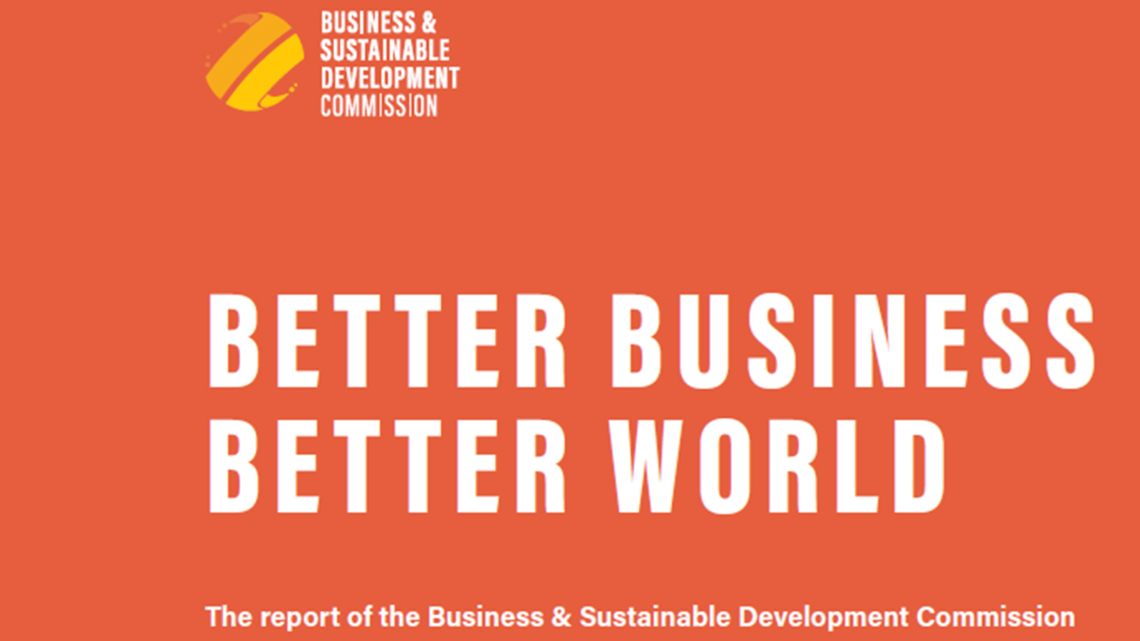London, 16 January, 2017: The BSDC’s flagship Better Business, Better World report, recognizes that while the last few decades have lifted hundreds of millions out of poverty, they have also led to unequal growth, increasing job insecurity, ever more debt and greater environmental risks. This mix has fueled an anti-globalization reaction in many countries, with business and financial interests seen as central to the problem, and is undermining the long-term economic growth that the world needs.
The report positions the Sustainable Development Goals (SDGs) as a compelling new strategy to reverse this trend, highlighting their potential to unleash innovation, economic growth, and development at an unprecedented scale. However, this potential will not be realized without radical change in the business and investment community. Real leadership is needed for the private sector to become a trusted partner in working with government and civil society to address the flaws in the current economic model.
The BSDC, which is comprised of 35 CEOs and civil society leaders, has spent the last year exploring the key question: “What will it take for business to be central to building a sustainable market economy-one that can help to deliver the SDGs?” The Better Business, Better World report seeks to answer this question while also highlighting the scale of the economic prize that could be available to business if the SDGs are realized.
Key findings of Better Business, Better World
- 60 sustainable and inclusive market “hotspots” in just four key economic areas could create at least US$12 trillion, worth over 10% of today’s GDP. The breakdown of the four areas and their potential values are: Energy US$4.3 trillion; Cities: US$3.7 trillion; Food & Agriculture US$2.3 trillion; Health & Well-being US$1.8 trillion.
- “SDG hot spots” identified in the report have the potential to grow 2-3 times faster than average GDP over the next 10-15 years. Beyond the US$12 trillion directly estimated, conservative analysis shows potential for an additional US$8 trillion of value creation across the wider economy if companies embed SDGs in their strategies. Furthermore, factoring in the cost of externalities (negative impacts from business activities such as carbon emissions or pollution) increases the overall value of opportunities by almost 40%.
- Two critical conditions must be met to build these new markets. First, innovative financing from both private and public sources will be needed to unlock the US$2.4 trillion required annually to achieve the SDGs. At the same time, a “new social contract” between business, government and society is essential to defining the role of business in a new, fairer economy.
About the Business & Sustainable Development Commission
The Commission brings together three dozen leaders from business, finance, civil society, labor, and international organizations, with the twin aims of mapping the economic prize that could be available to business if the SDGs are achieved, and describing how business can contribute to achieving them. The SDGs set out 17 objectives to eliminate poverty, improve education and health outcomes, create better jobs and tackle our key environmental challenges by 2030.
Peter Bakker, President and CEO of the World Business Council for Sustainable Development (WBCSD), serves as a Commissioner alongside the following WBCSD Council Members: Sunny Verghese (Co-Founder and CEO, Olam), Paul Polman (CEO, Unilever and Chairman, WBCSD), and Svein Tore Holsether (CEO, Yara International).
Commissioner quotes
President and CEO, WBCSDThe Sustainable Development Goals cannot be achieved without business. This report presents a quantifiable and compelling economic argument for taking action, and convincingly makes the case for systemic change in the way we do business. It is written in a language that will allow business leaders around the world to take tangible, meaningful action at scale. At company and sector level, we must drive system change in order to realize sustainable and inclusive economic growth across the world.
Chair of the Business and Sustainable Development CommissionThis report is a call to action to business leaders. We are on the edge and business as usual will drive more political opposition and land us with an economy that simply doesn't work for enough people. We have to switch tracks to a business model that works for a new kind of inclusive growth. Better Business, Better World shows there is a compelling incentive for why the latter isn’t just good for the environment and society; it makes good business sense.
CEO Unilever and Chairman, WBCSDAt a time when our economic model is pushing the limits of our planetary boundaries and condemning many to a future without hope, the Sustainable Development Goals offer us a way out. Many are now realizing the enormous opportunities that exist for enlightened businesses willing to stand up and address these urgent challenges. But every day that passes is another lost opportunity for action. We must react quickly, decisively and collectively to ensure a fairer and more prosperous world for all.
CEO, Yara InternationalWith 800 million people hungry, a growing population, and food production putting pressure on the climate, the SDGs are our wake-up call AND our framework for strategy. Let’s transform words into action.
More information
- Download the “Better Business, Better World” report and its executive summary
- Executive summaries are also available in the following languages: Portuguese, Chinese, French, Indonesian, Japanese, Korean, Russian, Spanish, Turkish, and Arabic
- For up-to-date resources, tools, case studies and insight on the SDGs, check out WBCSD’s SDG Business Hub
- WBCSD contact point: Filippo Veglio, Managing Director, Social Capital – veglio@wbcsd.org


